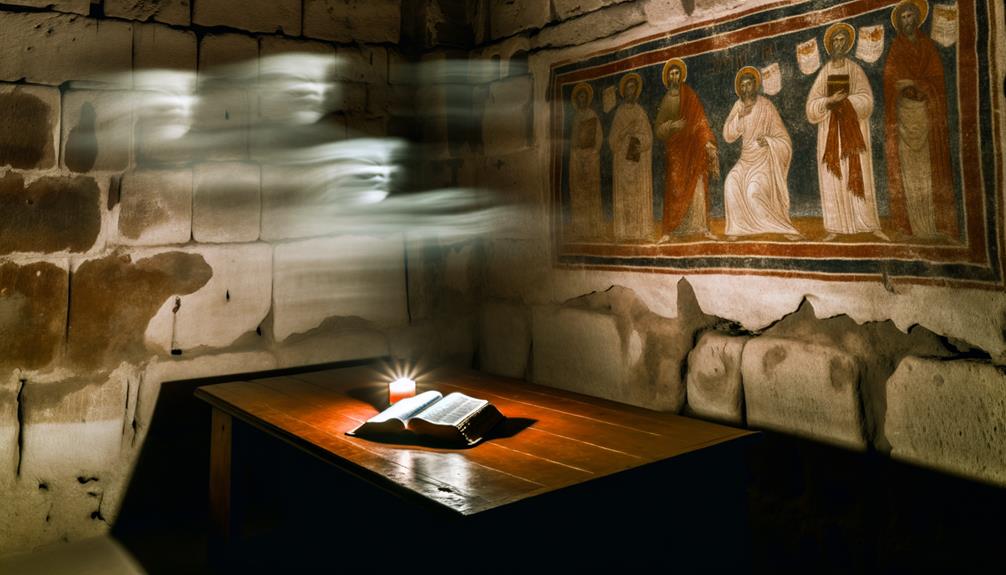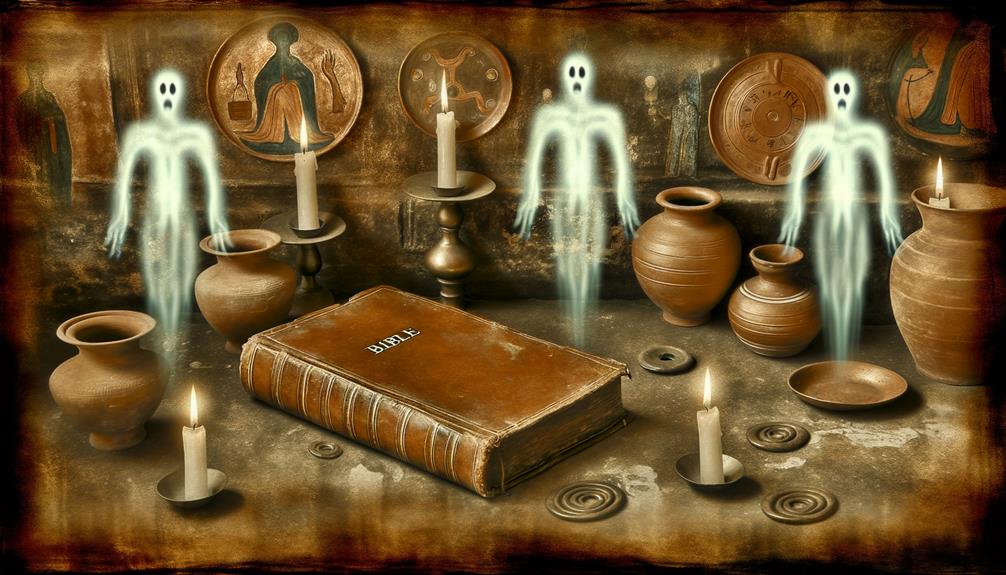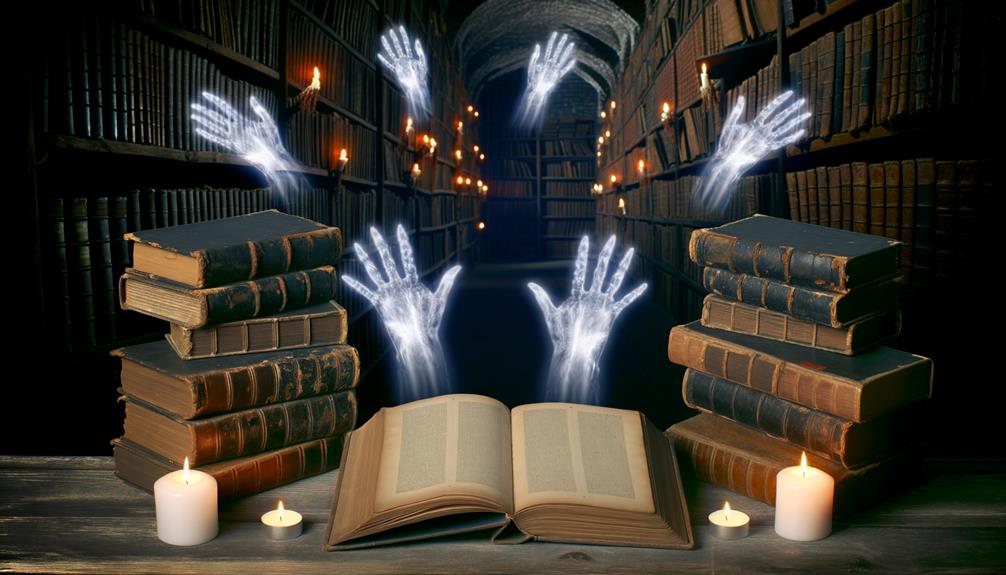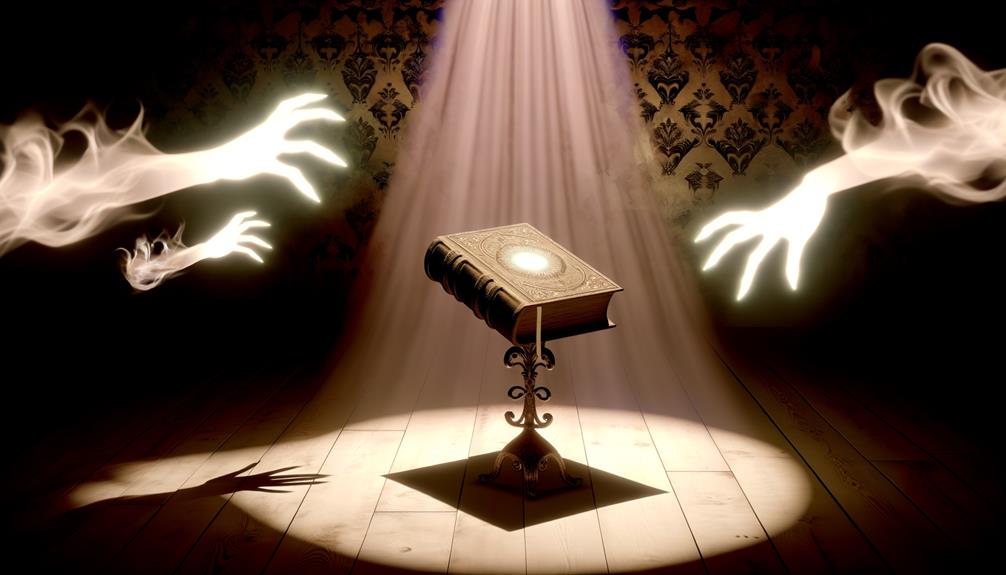Making Love to the Dead Meaning Bible: Spiritual Warnings
In examining the Bible’s take on making love to the dead, I find that its theological and ethical stance is clear. Scriptures like Deuteronomy 18:10-12 and Leviticus 19:31 condemn necromancy and engaging with the deceased.
These prohibitions emphasize the sanctity of life and the body as a temple, as seen in 1 Corinthians 6:19-20. Historically, ancient practices of necromancy among polytheistic cultures contrast with the Israelites’ divine mandate to maintain purity and exclusive worship of God.
Biblically, engaging with the dead disrupts spiritual purity and dishonors God’s creation. There’s more depth to uncover in understanding these ancient prohibitions.

The Biblical Perspective on Making Love to the Dead: Symbolism of Purity, Defilement, and Spiritual Warnings
| Aspect | Biblical Meaning | Scriptural Significance |
|---|---|---|
| Defilement of the Body | In the Bible, engaging in acts with the dead is considered an abomination and a defilement of the sacredness of the human body, which is made in God’s image. | Reflects the concept of the body being a temple, emphasizing the need for purity and respect for the dead (1 Corinthians 6:19-20). |
| Spiritual Warning Against Necromancy | The Bible strictly forbids any form of communication or interaction with the dead, associating such acts with necromancy and occult practices. | Leviticus 19:31 and Deuteronomy 18:10-12 warn against consulting the dead, categorizing it as an act that draws one away from God. |
| Violation of God’s Laws | Making love to the dead would violate God’s law of respecting the sanctity of life and death, as human relationships are meant to exist between the living. | Reflects Leviticus 21:1-4, where priests were commanded to avoid contact with the dead to remain pure. |
| Symbol of Spiritual Death | Engaging with the dead in this context can symbolize spiritual death or disconnection from God, as it represents a departure from the path of righteousness. | Reflects the idea that death in the Bible is often symbolic of separation from God’s grace (Romans 6:23). |
| Unholy and Unnatural Acts | The Bible condemns unnatural acts and impurity, which would include any form of interaction with the dead in a sexual manner as it goes against God’s created order. | Referenced in Romans 1:24-27, which speaks against degrading passions and unnatural relations. |
| Call to Repentance and Purity | Those who engage in practices related to the dead are often urged to seek repentance and turn away from such defilements to restore their purity before God. | The Bible offers forgiveness and restoration for all sins through repentance (1 John 1:9), emphasizing the possibility of spiritual renewal. |
Biblical References

When examining the biblical references, it’s essential to explore the specific scriptures that address the concept of necromancy and its ethical implications within the Judeo-Christian tradition.
Deuteronomy 18:10-12 explicitly condemns necromancy, listing it among practices that are detestable to the Lord.
Leviticus 19:31 warns against turning to mediums or seeking out spiritists, as these actions defile a person.
The narrative of King Saul consulting the Witch of Endor in 1 Samuel 28 underscores the gravity of seeking the dead, resulting in dire consequences for disobeying divine commandments.
These passages highlight a theological stance against necromancy, urging believers to seek guidance from God rather than the dead.
This serves as a moral directive for those committed to a life of service and righteousness.
Historical Context

Understanding the historical context requires us to examine how ancient cultures surrounding Israel practiced necromancy and how these interactions influenced the biblical prohibitions we see.
In ancient Mesopotamia, Egypt, and Canaan, necromancy involved rituals to communicate with the dead, seeking guidance or power. These practices often included invoking spirits through complex rites, which were deeply intertwined with their polytheistic beliefs.
The Israelites, aiming to maintain their covenant with Yahweh, were commanded to avoid such practices, which were seen as abominations. These cultural interrelations underscore the biblical injunctions against necromancy, emphasizing purity and exclusive worship of God.
Metaphorical Interpretations

Exploring metaphorical interpretations of necromancy in the Bible reveals profound theological insights that transcend mere literal prohibitions.
I find that necromancy, often condemned as summoning the dead, can symbolize clinging to outdated beliefs or sinful pasts. This metaphorical reading encourages us to examine how our spiritual lives might be hindered by holding onto what’s spiritually ‘dead’.
In engaging with these texts, I’m reminded to seek renewal and transformation, aligning with God’s living word. This perspective urges us to let go of what no longer serves our spiritual growth, fostering a community that thrives on life, hope, and divine guidance.
Theological Perspectives

In delving into the theological perspectives on necromancy in the Bible, I find it essential to examine how these prohibitions reflect deeper spiritual truths about life, death, and the sanctity of divine communication.
The Bible explicitly forbids necromancy, revealing several key theological insights:
- Sanctity of Life: Life is a sacred gift from God, and attempting to communicate with the dead undermines this divine principle.
- Divine Authority: God’s sovereignty over life and death underscores that only He holds ultimate authority over these domains.
- Purity of Worship: Engaging with the dead can lead to idolatry and corrupt the pure worship that God demands.
These points reveal why necromancy isn’t just forbidden, but fundamentally opposed to biblical theology.
Cultural Significance

Many cultures throughout history have grappled with the concept of communicating with the dead, revealing a universal human curiosity about the afterlife and the boundaries between the living and the deceased.
Ancestors were often revered, believed to provide wisdom and guidance. In ancient Egypt, elaborate funerary practices reflected a deep concern for the soul’s journey.
Similarly, the Dia de los Muertos in Mexican culture celebrates the dead, emphasizing familial bonds beyond death.
Biblically, instances like Saul consulting the spirit of Samuel highlight both intrigue and theological prohibitions against necromancy.
These practices underscore our shared desire to connect with loved ones who’ve passed on, serving as a reflection of the human spirit’s quest for continuity and meaning amid life’s impermanence.
Scholarly Debates

When I examine interpretative variations, I notice scholars often clash over the theological implications of this controversial topic.
Some argue that the text metaphorically addresses spiritual death and estrangement from God, while others contend it highlights physical and ritualistic prohibitions.
This scholarly debate challenges us to reconsider our understanding of ancient cultural contexts and scriptural intent.
Interpretative Variations Discussed
Scholarly debates surrounding the interpretation of making love to the dead in biblical texts reveal a complex tapestry of theological perspectives and cultural contexts. I’ve encountered various viewpoints that highlight how scholars approach this topic.
- Historical Context: Some scholars argue that understanding ancient Near Eastern burial practices is essential for interpreting these texts. They believe cultural norms influenced biblical prohibitions.
- Linguistic Analysis: Others focus on the original Hebrew and Greek terms, contending that translations can obscure the true meanings and intentions behind these scriptures.
- Theological Implications: A third group examines the broader theological framework, exploring how these passages relate to doctrines of purity, holiness, and resurrection.
Each perspective offers unique insights, deepening our understanding of these difficult and often misunderstood texts.
Theological Implications Analyzed
The theological implications of biblical prohibitions against necrophilia warrant a thorough examination of how these texts intersect with doctrines of purity, sanctity of life, and eschatological beliefs.
As I explore this, I find that such prohibitions underscore the absolute sanctity of life, even in death.
The concept of purity, central to biblical law, is violated by necrophilia, rendering it an act that defiles both the living and the dead.
Additionally, eschatological views on resurrection and eternal life highlight the importance of respecting the deceased, as they await divine judgment.
This analysis reveals that the prohibitions aren’t merely societal taboos but are deeply rooted in theological principles that aim to honor God’s creation and uphold His divine order.
Ethical Considerations

When I consider the ethical implications of making love to the dead within the biblical context, I must first analyze the moral framework the Bible offers. The Bible emphasizes the sanctity of life and the importance of respecting the deceased. The idea of making love to the dead goes against the theology of the Bible and the concept of enduring love in the Bible. The Bible also teaches that love is meant to be expressed within the bounds of marriage, which does not extend to relationships with the deceased.
The texts provide clear prohibitions against necrophilia, which reflect broader theological principles about the sanctity of human bodies.
Moral Implications Explored
Examining the ethical considerations of making love to the dead through a biblical lens reveals profound moral and theological dilemmas that challenge both ancient and contemporary understandings of human dignity and sanctity.
I find that these moral implications can be broken down into three key areas:
- Human Dignity: Violating the sanctity of a deceased body disrespects the inherent worth bestowed upon every individual by God.
- Divine Law: Such acts contravene divine commandments, which call for the preservation of purity and respect for the dead.
- Community Impact: Engaging in these actions erodes societal morals, undermining the collective effort to uphold ethical standards rooted in biblical teachings.
Addressing these points reveals the need for a deeper commitment to respectful, compassionate living in service to others.
Biblical Texts Analyzed
Analyzing key biblical texts, I find that scripture unequivocally condemns acts that defile the sanctity of the human body, both in life and after death.
The Old Scripture law in Deuteronomy 21:22-23 emphasizes the respect due to a deceased body by mandating its prompt burial.
Similarly, 1 Corinthians 6:19-20 highlights the body as a temple of the Holy Spirit, underscoring its sacredness.
These passages collectively affirm that any act violating this sanctity, including necrophilia, is an abomination.
Such acts not only dishonor the individual but also contravene the divine order.
As stewards of God’s creation, we’re called to uphold the dignity of every human being, living or deceased, by respecting their bodies in accordance with scriptural teachings.
Modern Interpretations

Modern interpretations of biblical references to the dead often reveal a complex interplay between ancient texts and contemporary understandings of spirituality.
I’ve noticed that scholars and theologians focus on various aspects to elucidate these texts:
- Cultural Context: Understanding the societal norms and beliefs of ancient times helps us grasp the original intent behind the scriptures.
- Linguistic Analysis: Examining the original Hebrew, Greek, or Aramaic words offers deeper insights into the meanings that might be lost in translation.
- Theological Reflection: Reflecting on how these ancient teachings align or conflict with modern Christian doctrines aids in forming a coherent spiritual perspective.
Spiritual Implications

Understanding the spiritual implications of biblical references to the dead requires a nuanced approach that considers both historical context and contemporary faith practices.
In ancient times, necromancy and other interactions with the dead were strictly prohibited, reflecting a profound respect for the sanctity of life and the afterlife.
Today, these prohibitions remind us to honor the spiritual boundary between the living and the dead.
Engaging with these texts helps us comprehend the sacredness of life and the importance of spiritual purity.
As someone committed to serving others, I recognize that our focus should be on uplifting the living while respecting the departed, ensuring our actions align with the deep spiritual truths conveyed in Scripture.
Conclusion
In exploring the biblical, historical, and metaphorical layers of ‘making love to the dead,’ I’ve found it raises more questions than answers.
How do we reconcile ancient texts with modern ethical standards and spiritual beliefs?
By delving into theological perspectives and scholarly debates, we uncover a rich tapestry of interpretations that challenge our understanding of life, death, and spirituality.
Ultimately, this exploration invites us to reflect deeply on our own beliefs and the cultural narratives that shape them.






